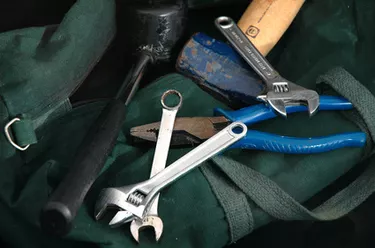
Snap-On Tools is a company that rents, sells, and leases equipment and tools to small businesses and consumers. The company has its own credit department that negotiates loans for its customers to purchase equipment. Like all loans, if these accounts fall into default, the consequences can be severe. It's important to know how to negotiate credit with Snap-On.
Step 1
Calculate your debt-to-income ratio (DIR). This ratio represents the amount you pay for monthly expenses compared to your monthly income. To calculate this, divide all monthly credit-reportable expenses by your monthly income. You'll likely be unable to negotiate with Snap-On if your DIR is below 50 percent (this shows an ability to manage debts).
Video of the Day
Step 2
Contact Snap-On Credit. Speak with an account servicing representative. Make sure you make the call before your account falls into default. Snap-On Credit agreements allow the company to repossess your equipment if the account goes delinquent.
Step 3
Ask about hardship programs at the company. These programs are not available to the general public as they are proprietary. In addition, these programs are reviewed on a case-by-case basis--there is not general eligibility. Last, hardship programs are often short-term and designed to help you recover from a financial hardship and resume a normal payment schedule.
Step 4
Collect any other documentation that supports your financial hardship. This can be statements of disability, unemployment or medical bills. These documents will help support your argument and may sway the credit department to look favorably on your application.
Step 5
Get new agreements in writing. If the terms of your loan change due to hardship, you must make sure there is a new contract. Review any new paperwork with a trusted advisor, such as a family accountant.
Tip
Do not avoid credit problems when they begin. Snap-On reserves the right to collect on its loans as soon as they fall into default. This can result in collection calls and negative credit reporting. Staying on top of bills is important, but it's more important to recognize financial problems before they become overwhelming.
Things You'll Need
Snap-On credit agreement
Income documents (pay stubs, W2s)
Video of the Day